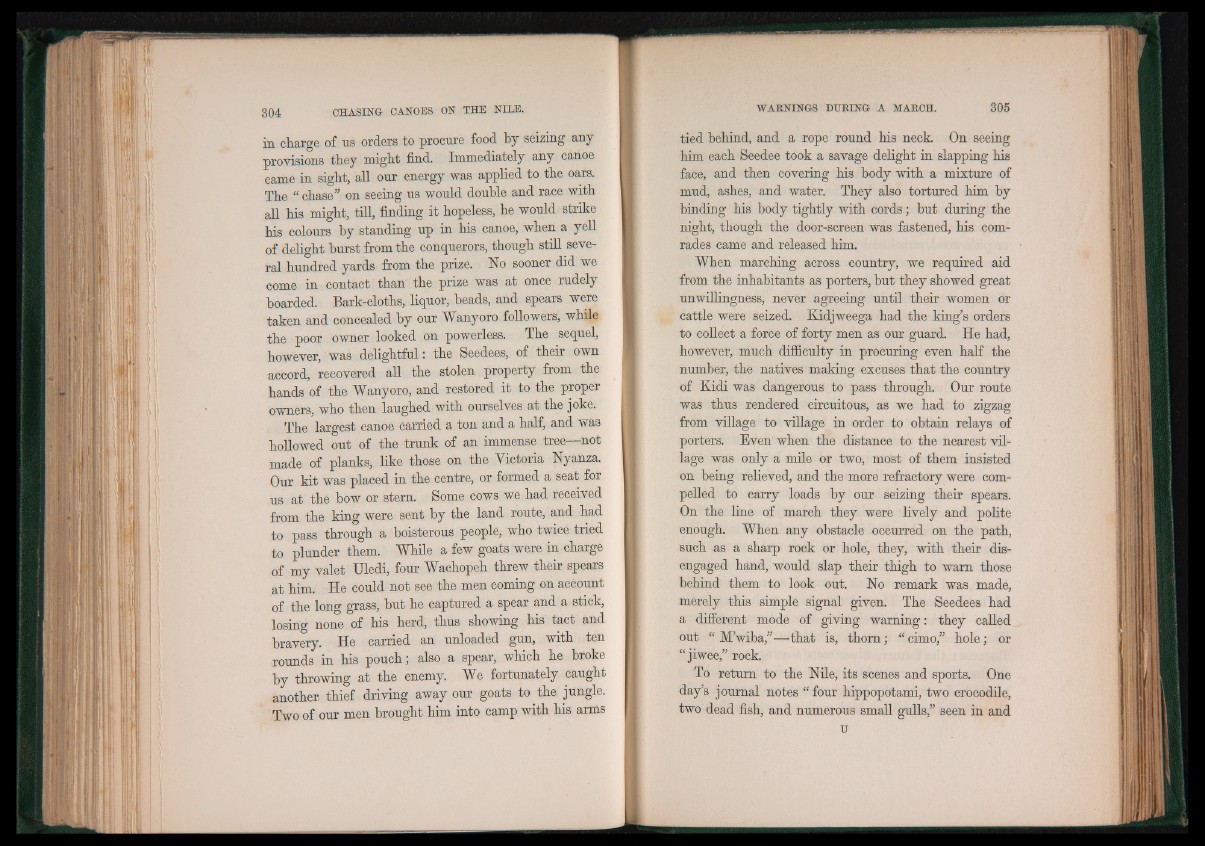
in charge of us orders to procure food by seizing any
provisions they might find. Immediately any canoe
came in sight, all our energy was applied to the oars.
The “ chase” on seeing us would double and race with
all his might, till, finding it hopeless, he would strike
his colours by standing up in his canoe, when a yell
of delight burst from the conquerors, though still several
hundred yards from the prize. No sooner did we
come in contact than the prize was at once rudely
boarded. Bark-cloths, liquor, beads, and spears were
taken and concealed by our Wanyoro followers, while
the poor owner looked on powerless. The sequel,
however, was delightful: the Seedees, of their own
accord, recovered all the stolen properly from the
hands of the Wanyoro, and restored it to the proper
owners, who then laughed with ourselves at the joke.
The largest canoe carried a ton and a half, and was
hollowed out of the trunk of an immense tree—not
made of planks, like those on the Victoria Nyanza.
Our kit was placed in the centre, or formed a seat for
us at the bow or stern. Some cows we had received
from the king were sent by the land route, and had
to pass through a boisterous people, who twice tried
to plunder them. While a few goats were in charge
of my valet Uledi, four Wachopeh threw their spears
at him. He could not see the men coming on account
of the long grass, but he captured a spear and a stick,
losing none of his herd, thus showing his tact and
bravery. He carried an unloaded gun, with ten
rounds in his pouch; also a spear, which he broke
by throwing at the enemy. We fortunately caught
another thief driving away our goats to the jungle.
Two of our men brought him into camp with his arms
tied behind, and a rope round his neck. On seeing
him each Seedee took a savage delight in slapping his
face, and then covering his body with a mixture of
mud, ashes, and water. They also tortured him by
binding his body tightly with cords; but during the
night, though the door-screen was fastened, his comrades
came and released him.
When marching across country, we required aid
from the inhabitants as porters, but they showed great
unwillingness, never agreeing until their women or
cattle were seized. Kidjweega had the king’s orders
to collect a force of forty men as our guard. He had,
however, much difficulty in procuring even half the
number, the natives making excuses that the country
of Kidi was dangerous to pass through. Our route
was thus rendered circuitous, as we had to zigzag
from village to village in order to obtain relays of
porters. Even when the distance to the nearest village
was only a mile or two, most of them insisted
on being relieved, and the more refractory were compelled
to carry loads by our seizing their spears.
On the line of march they were lively and polite
enough. When any obstacle occurred on the path,
such as a sharp rock or hole, they, with their disengaged
hand, would slap their thigh to warn those
behind them to look out. No remark was made,
merely this simple signal given. The Seedees had
a different mode of giving warning: they called
out “ M’wiba,”—that is, thorn; “ cimo,” hole; or
“ jiwee,” rock.
To return to the Nile, its scenes and sports. One
day’s journal notes “ four hippopotami, two crocodile,
two dead fish, and numerous small gulls,” seen in and
u